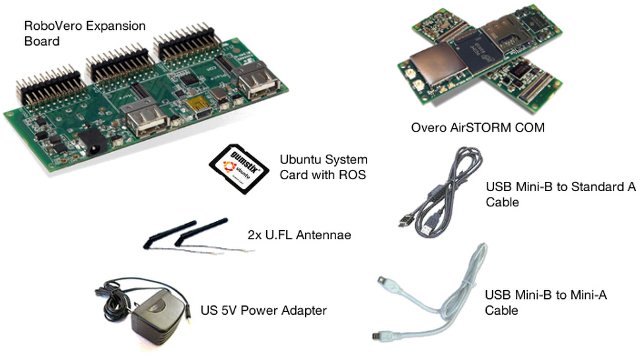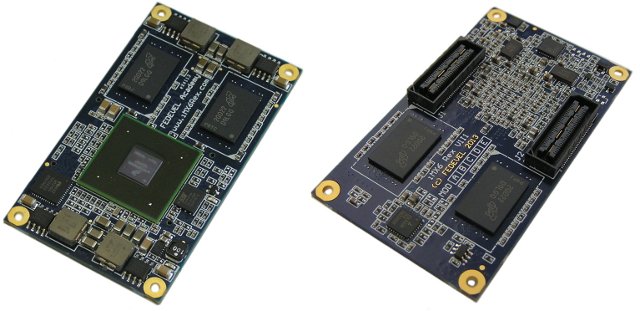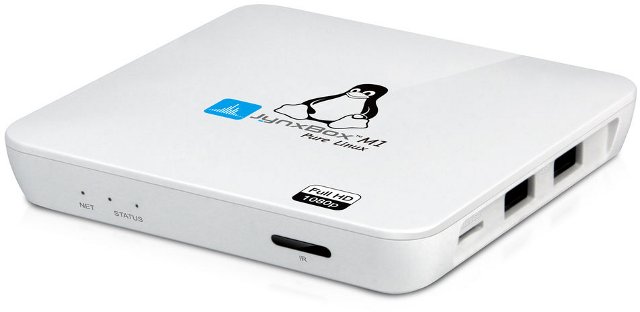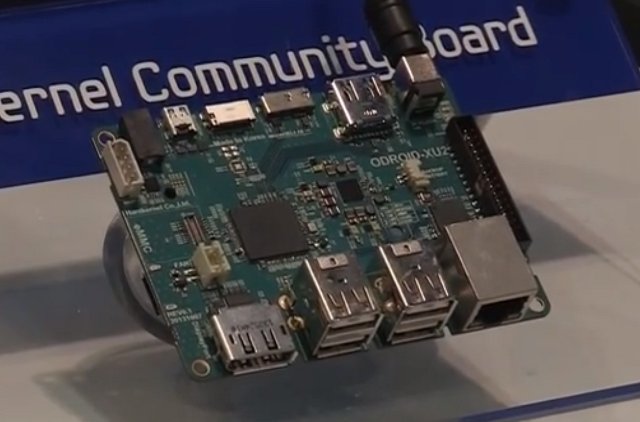Gumstix has recently unveiled several solution kits featuring their Overo and DuoVero Computer-on-Modules (CoMs), Pepper single board computer, and several expansions boards, together with required accessories, and software packages, in order to help their customers getting started more easily. All these solutions are based on Texas Instruments OMAP3, OMAP4, and/or Sitara processors, and run Linux (Ubuntu or Yocto), and sometimes Android for the kits with displays. The solutions kits target 6 different types of applications and/or markets: Robotics Robotic Development Kit (Pictured above) with one Overo AirSTORM CoM (OMAP3703), and RoboVero expansion board. The kit is better suited for motor control applications. Mobile Robotic Development Kit with one Overo AirSTORM CoM, and Turtlecore expansion board to be used with iRobot Create. The kits ship with a Linaro (Ubuntu for Overo) system card and Robot Operating System (ROS) pre-installed. Handhelds 3.5″ Handheld Development Kit featuring Overo AirSTORM CoM with Alto35 cutomizable […]
iMX6 Rex Open Source Hardware SoM and Baseboard Designed to Teach Schematic and PCB Layout Design
Voipac, a Slovakian manufacturing company, has recently unveiled iMX6 Rex module and iMX6 Rex development baseboard, which have mainly been developed in order to support FEDEVEL Academy Schematic Design and Advanced PCB Layout courses, but can also be used for other purposes. The module is powered by Freescale i.MX6 Dual (Solo and Quad also available on request), and comes with 512MB RAM (upgradeable to 4GB), and up to 32MB SPI flash. The complete hardware will be released under an open source hardware license, but with some caveats as I’ll explain later. iMX6 Rex module specifications (basic configuration): SoC – Freescale iMX6 processor up to 1.2GHz / 2 cores (1 and 4 cores also available) System Memory – 512MB DDR3-1066 (533MHz), up to 4GB Storage – 2MB On board SPI Flash, up to 32MB 10/100/1000 Mbps Ethernet PHY 2 high speed board to board connectors (only one required) with signals for HDMI, […]
Binwalk Utility Helps You Analyze and Reverse-Engineer Firmware Files
Binwalk is a “firmware analysis tool designed for analyzing, reverse engineering and extracting data contained in firmware images”. This tool written in python supports Linux, and somewhat Mac OS X, can scan firmware files for files signature, and can be useful for hacking firmware files, and finding hidden information. Let’s install binwalk first. It’s very easy in a Debian or Ubuntu machine, as you just have to download the package, and run a script for installation:
|
1 2 3 4 |
wget https://binwalk.googlecode.com/files/binwalk-1.2.2-1.tar.gz tar xzvf binwalk-1.2.2-1.tar.gz cd binwalk-1.2.2-1/src sudo ./debian_quick_install.sh |
If you have another Linux ditributions, it’s just a little more complicated. You still need to download and extract the release package as above, but you’ll have to install the following package depending on the features your need: Minimal installation – python 2.6 or greater, and python-magic To generate entropy plot graphs – python-matplotlib For automated extraction: Packages – mtd-utils zlib1g-dev liblzma-dev gzip bzip2 tar unrar arj p7zip p7zip-full openjdk-6-jdk Build and install […]
$90 JynxBox M1 Pure Linux XBMC Network Media Streamer
After The Little Black Box (TLBB), there’s now another ARM based media player that comes pre-installed with XBMC Linux: Jynxbox M1 Pure Linux. The device is based on AMLogic AML8726-M1 single core Cortex A9 processor @ 800MHz, and comes with 2GB flash, Wi-Fi and Ethernet connectivity, HDMI output, and more. Jynxbox M1 Pure Linux specifications: SoC – AMLogic AML8726-M1 single core Cortex A9 @ 800MHz with ARM Mali-400 GPU System Memory – N/A (but likely 512 MB) Storage – 2 GB Nand Flash + micro SD/SDHC memory slot (Up to 32GB) Video Output – HDMI 1.3 Audio Output – HDMI Video container formats – AVI, RM/RMVB, MKV, WMV, MOV, MP4, WEBM, DAT(VCD format), VOB(DVD format), MPEG, MPG, FLV, ASF, TS, TP, 3GP Audio formats – MP3, WMA, WMV, APE, OGG, FLAC, AAC, etc… Connectivity – 10/100M Ethernet + 802.11 b/g/n Wi-Fi USB – 3x USB 2.0 host ports Misc – […]
Terasic’s Altera DE1-SoC Board Based on Cyclone V Dual Cortex A9 + FPGA SoC Sells for $150 Up
A few months ago, Terasic unveiled its SoCKit powered by Altera Cyclone V dual Cortex A9 + FPGA. They’ve now announced a cheaper version will a less powerful Cyclone V SoC and lower specs (e.g. less RAM, only one sensor, etc…) that sells for as low as $150 for educational or academic purposes, and $199 for the rest of us. Altera DE1-SoC Board specifications: FPGA Device Cyclone V SoC 5CSEMA5F31 Device Dual-core ARM Cortex-A9 (HPS – Hard Processor System) 85K Programmable Logic Elements 4,450 Kbits embedded memory 6 Fractional PLLs 2 Hard Memory Controllers Configuration and Debug Quad Serial Configuration device – EPCQ256 on FPGA (EPCQ = Erasable Programmable Configurable Quad-SPI device) On-Board USB Blaster II (Normal type B USB connector) Memory Device 64MB (32Mx16) SDRAM on FPGA 1GB (2x256Mx16) DDR3 SDRAM on HPS 128MB QSPI Flash on HPS (QSPI Flash does not come pre-installed out of factory) Micro SD […]
XBMC on ARM News: Updated XBMC Image for i.MX6 Boards, Geniatech Releases XBMC for Android Source Code
Stephan Rafin has recently released a new XBMC image for Freescale i.MX6 based Wandboard development boards (dual and quad only) and Utilite computers. The images have been built with Yocto 1.5 (Dora) released last month, and are based on XBMC Gotham Alpha 9, the latest alpha before feature freezes. That means this is not a stable image just yet, but features won’t change, and this version of XBMC is now going though bug fixes. Stephan’s XBMC image includes the following: iMX6 hw accelerated decoding (VPU) for most standard formats iMX CEC support (for utilite only as wandboards are not properly wired) WIFI configuration thanks to network manager addon Support for HDMI/SPDIF/Analog sound outputs (including pass-through for HDMI and SPDIF) SMB/NFS/uPNP network shares and other standard XBMC features Bug fixes against previous version – No more transient black screens, trick modes (ffwd, frwd, ..) are now working, and smoother video playback. […]
Linaro 13.10 Release with Linux Kernel 3.12 and Android 4.3
Linaro has just posted a blog entry to announced Linaro 13.10 was available for download. This is normally supposed to occur on the last Thursday of the month, but it’s possible the release occurred on scheduled, and the blog post was late, or it may have been delayed because of Linaro Connect US 2013. You can access a summary of the event together with slides and videos of the sessions and keynotes when available. This release includes the Linux Kernel 3.12-rc5 (staging), Kernel 3.10.14 (LSK), Android 4.3.1, and Ubuntu Linaro 13.10 (still based on Raring). Android has been ported and updated to 4.3.1 from AOSP, and the OS can now boot using UEFI. More work has been done on ARM 64-bit (aka ARMv8 or Aarch64) for Android, the Linux kernel, and tools such as uprobes, o-profile, and ftrace. Some new hardware platforms I may have missed before have popped up […]
Hardkernel ODROID-XU2 Development Board with Exynos 5420 Coming Up in Q1 2014
Insignal recently announced that Arndale Octa with an Exynos 5420 was available for pre-order with shipping expected in December 2013, making it the first company providing a low cost big.LITTLE development board. But there will be some competition as Hardkernel will launch ODROID-XU2 also based on Samsung Exynos 5420 octa-core processor according to a tweet by SamsungExynos official twitter account. The board is also briefly mentioned in an article in Samsung website as it was showcased at ARM Techcon 2013. That’s actually all the information I have. There’s a brochure on ARMFlix’s video, but it’s unreadable. However, we can derive (guess) some of the specifications based on the picture above and ODROID-XU specs: SoC – Samsung Exynos 5420 octa core SoC with 4x Cortex A15 cores up to 1.8 GHz, 4x Cortex A7 cores up to 1.3 GHz in big.LITTLE configuration, and ARM Mali T-628 MP6 GPU System Memory – […]








